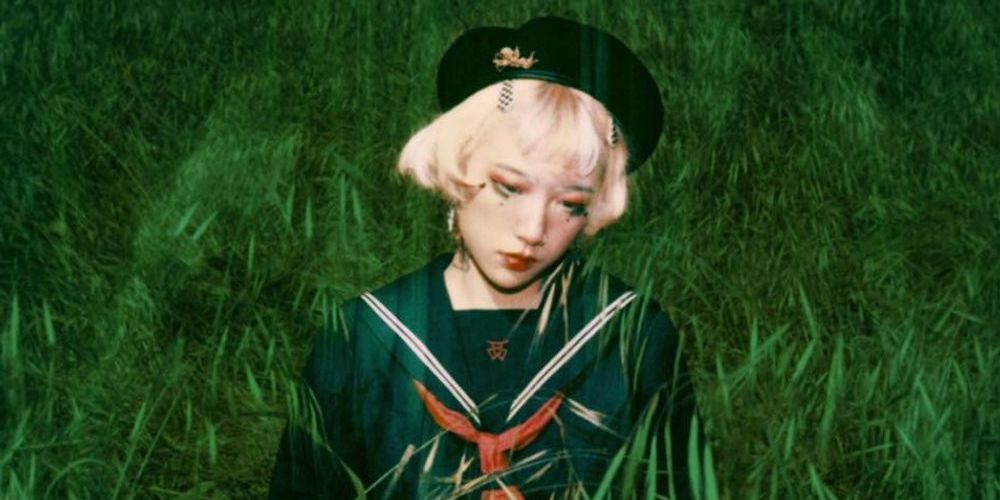By Nii-Ayi Aryeetey ’23

Singaporean artist Nat Ćmiel, known better as “yeule,” has been creating icy, ethereal music since their teenage years. Currently based in London, they are one of the most exciting forces in independent music. Their newest full-length album, “Glitch Princess,” is their most well-developed and cathartic release to date.
Yeule’s 2019 debut full-length release, “Serotonin II,” is a deeply emotional album filled with pillowy synths, soft singing, and carefully crafted soundscapes. When I discovered this album, I was immediately enamored with its production techniques, along with its calm, ambient sound. However, I felt that some of the tracks could have been developed further. I wished that the album had a wider range of sounds, and I thought it could have benefited from more abrasive textures. Yeule delivers that and more on “Glitch Princess,” building on “Serotonin II” in exciting ways.
“Glitch Princess” certainly lives up to its title. The album’s 12 tracks are meticulously produced, featuring unique vocal processing, off-kilter drum beats, and glitchy, ethereal instrumentals, which make for a variety of interesting textures. At the forefront of many of the instrumentals is the guitar, an instrument that yeule has seldom used in their previous music. The use of guitar is especially effective in “Don’t Be So Hard on Your Own Beauty,” which is put together with nothing more than simple acoustic guitar, yeule’s vocals, and minor additional instrumentation. Fuzzy guitar playing, coupled with thumping drums, closes out the track “Perfect Blue” and creates a hypnotic texture. The new guitar textures found on this album are a welcomed evolution of yeule’s music, and indicate to me that yeule themselves feel like they are evolving.
Adding to the diversity of sounds found in this album is the use of droning tones in many tracks, such as “Flowers Are Dead,” “Eyes,” and “Fragments.” Yeule has used sustained notes and sounds in previous releases, but the use of drones in this album — often coupled with piano or guitar — creates a more cohesive sound than in their previous music. At some moments in the album, the drones are abrasive and noisy, which held my attention by creating atmospheres previously unexplored on the album.
In the second half of “Glitch Princess,” yeule introduces dance-inspired beats, increasing the tempo of their tracks. “Too Dead Inside” is a synth-filled track with a beat inspired by dancehall, a Jamaican dance genre, and still sounds uniquely like a yeule creation. “Bites on My Neck” leans in even deeper to dance music, building up to a booming trance and house-inspired beat in its chorus. The inclusion of dance influences may be partially inspired by PC Music founder Danny L Harle, who is known for producing lively pop songs with Charli XCX and Caroline Polachek, and is a co-producer on “Glitch Princess.”
Many songs on the album are beautiful yet unsettling. A key example of this is “Flowers Are Dead,” which consists of droning guitar and a drum beat that never settles into a groove. The instrumentals effectively emphasize yeule’s lyrics, expressing sentiments of feeling unlovable and uncomfortable in their own body. In general, the lyricism of the album is dark and unnerving, in comparison to the prettiness of the instrumentals. In “Don’t Be So Hard on Your Own Beauty,” yeule sings, “You make me cry and wipe my eyes, and make me feel something other than desolated nothing,” lyrics that contrast with the floating, calming acoustic guitar-based instrumentals.
A common lyrical theme in “Glitch Princess” is dissatisfaction with one’s own body, and the corresponding desire to disassociate from that body. Yeule discusses these feelings in relation to health struggles like gender dysphoria and eating disorders. The album most directly approaches this theme in “Too Dead Inside,” where yeule sings, “I can only get so close to looking how I want to be.” They also sing about wanting to be reconstructed — for instance, in the line “Sew me up, stitch me up, put me back together” from the chorus of “I <3 U.” This lyrical content makes the album especially impactful. Feeling trapped inside one’s own body is a serious, potentially debilitating feeling, and yeule has crafted beautiful music that wrestles this difficult topic.
My highlights of this album are “Electric,” “Don’t Be So Hard on Your Own Beauty,” and “Too Dead Inside.” However, every track is certainly worth listening to, and the album is an incredibly cohesive collection of songs. The sequencing of “Glitch Princess” is smooth, and the detailed production style encourages me to return to the album to discover sounds I hadn’t noticed the first few times. Upon first listen, yeule once again impressed me with their immersive soundscapes and cathartic songwriting. I am excited to see where yeule goes with their music in the future, and I recommend this album for anyone who loves creative production, ethereal sounds, and raw lyrics.
